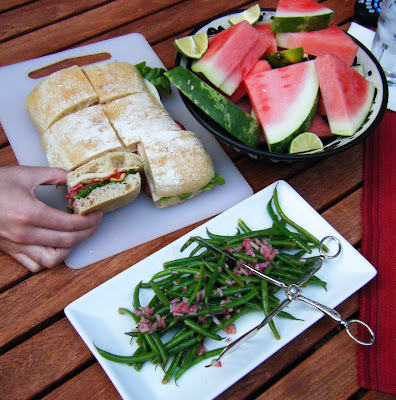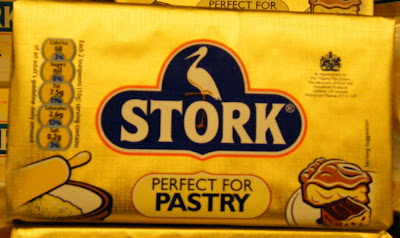Traditional Irish Cooking, Darina Allen.
If you were raised like I was – by a French-descent
mother married to an Irish-descent man – this book
will dispel any lingering myths that all Irish food
is bland and boring. (As newlyweds, my parents
lived for a short time with my paternal grandparents,
from whence cometh my mother’s opinions on
Irish cooking. Apparently, my mom’s sumptuous
Gallic feasts were the envy of the entire household,
much to my grandmother’s dismay!)
Anyway, Darina Allen is the founder of the much-regaled
Ballymaloe Cookery School in County Cork. And in this
wonderful book, she chronicles centuries of Hibernian
culinary traditions with lots of appealing recipes
and stunning photography.
Not surprising, there is an entire chapter dedicated
to the subject of potatoes. This statistic stunned me:
“…in pre-Famine Ireland the average cottier, or landless
laborer, consumed anything between seven and fourteen
pounds of potatoes per day.”
During the Famine, census records show that a million
people died and two million emigrated. While those
are astonishing numbers in any scenario, consider
the fact that the square-mileage of Ireland is only slightly
greater than that of Washington state. Consider again
that this these deaths and this emigration took place
in a relatively short time period: from 1845-47.
These are sobering facts, and gives one a new respect
for the simple potato.
But back to the cooking. In addition to the potato chapter,
there is one titled “Food from the Wild” -- fraughans,
medlar, samphire, dilisk and dulse -- and one by the name
of “Offal” -- pig parts, blood, tripe and such.
As always, my favorite chapters are those for breads
and desserts. Apples figure significantly in the Irish
dessert landscape: dumpling, fritters, pies, crumbles,
as well as apple snow, soufflé and cake. There is a
recipe for Worcesterberry Tart – a worcesterberry is
an old-fashioned species of black gooseberry. There
is a Blackcurrant Fool, a Gooseberry & Elderflower
Fool, a Strawberry Fluff. There is the less poetic
Stewed Seasonal Fruit. There is Currant & Apple
Roly-Poly, and Grandmother’s Fierling. This last
recipe has such intriguing name, I thought I’d
include the recipe:
4 eggs
5 T. flour
5 T. milk
5 T. superfine sugar
4 T. butter
Separate the eggs. Put the yolks in a bowl, add the flour
and milk and mix until you have achieved the consistency
of thick cream. Whisk the eggs whites stiffly with the sugar
and fold into the mixture.
Gently heat two frying pans (nonstick is best).
Add half the butter to each. Divide the batter mixture
between the pans and cook until the bottom
is a golden brown. Slide one of the ‘fierings’ onto
a warmed serving dish, crispy side down and puffy side
up. Gently place the other fierling on top, brown
side upwards. Pour the pan juice over the top and serve
immediately, just as it is or decorated with some summer
berries.
I’ve not yet tried this – but plan to do so soon!
There is an Irish Coffee Meringue that sounds extraordinary,
as well as three recipes for mincemeat, which I shall ignore.
And then this absolutely conundric (not sure if that’s
a word but I am using my Poetic License) recipe for
Beestings Pancakes. What the -- ???? According to Darina
Allen, “Beestings is the name of the very rich milk which
the cow produces immediately after the calf is born.”
And the recipe, in case you have the good
fortune to happen upon some beestings:
6 cups flour
1 t. baking powder
pinch of salt
1 T. sugar
beestings
butter for frying
Sieve the flour, baking powder and salt into a bowl.
Whisk in enough beestings to make a thin or slightly thick
batter, depending on whether you want thin or thick
pancakes. Drop tablespoonfuls onto a hot greased griddle
and cook for about 5 minutes on each side. Serve hot
with butter for tea.
I purchased Irish Traditional Cooking four years ago
in September during my first trip here with Paul.
I’ve always left it here on the shelf, but this trip
it’s getting packed in the luggage to go back to Seattle.
I intend to make good use of it. And if you’re
interested in Really Good Traditional Irish Cooking,
let me know. You just might get an invitation to partake.

































